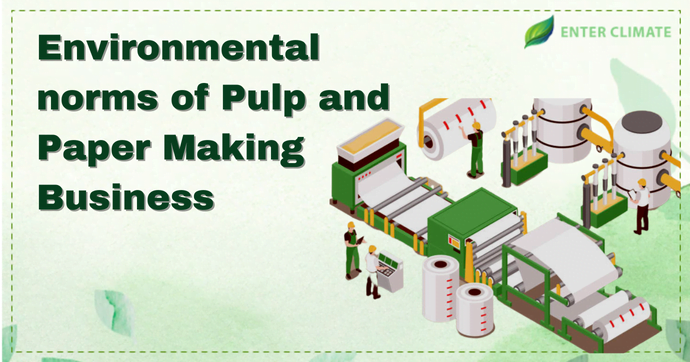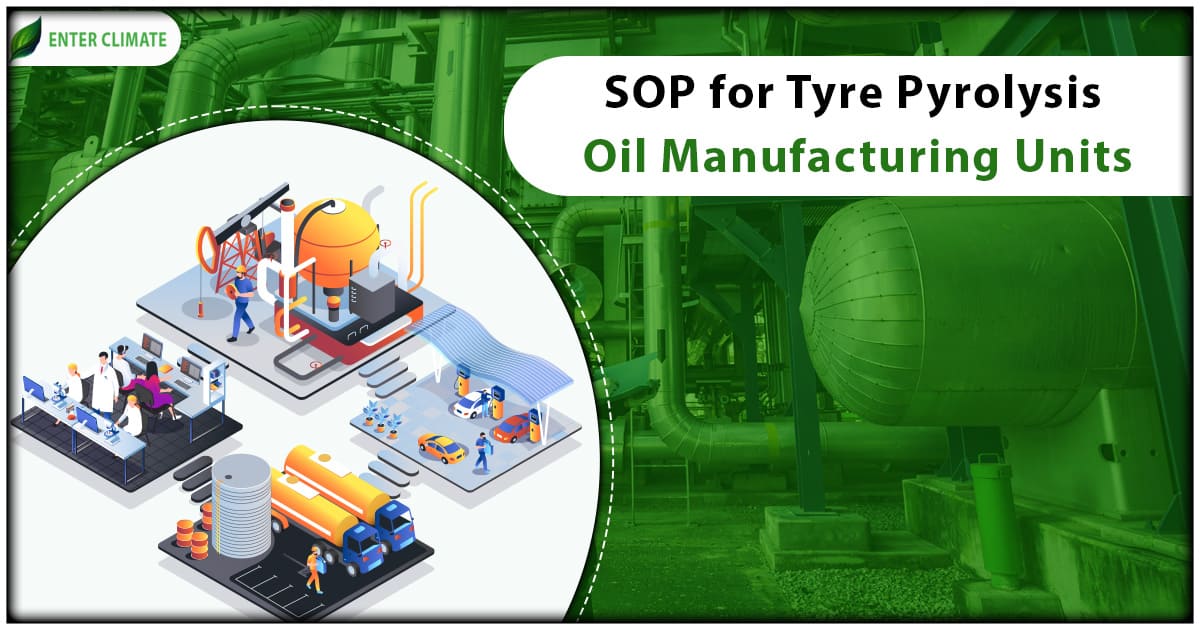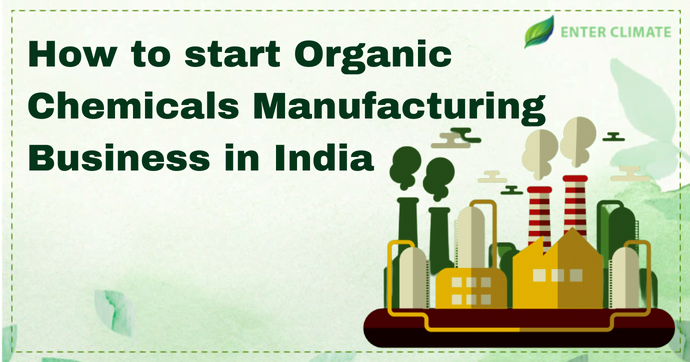Environmental norms of Pulp and Paper Making Business
 28 Sep, 2022
28 Sep, 2022 
India’s demand for paper and paper products is increasing daily with the increasing use of tea bags, writing paper tissue paper, and improving infrastructure and transportation services. Around 515 manufacturing units in the country are involved in the pulp and papermaking business. But apart from generating revenue and increasing the availability of paper, the pulp and papermaking businesses are also responsible for generating waste that has a detrimental impact on the environment. The waste generated in this business is categorised under the Hazardous and Other Wastes (Management and Transboundary Movement) Rules, 2015.
The steps involved in Pulp and Paper Making Business
The crucial steps involved in pulp and paper making business are: –
- Preparation of raw material (Debarking of wood and chipping)
- Wood pulping
- Pulp bleaching
- Paper manufacturing
The procedure that takes place in the pulp and paper making business is as follows: –
- The pulping procedure is used to separate and clean the fibres.
- Once the pulping procedure is done, the refining process follows.
- Subsequently, the dilution process is used to form a thin fibre mixture.
- Later, fibres are formed on a thin screen.
- Pressurisation is done to boost the density of the material.
- Once the pressurisation is done, the material is dried to enhance density.
- The process concludes by providing a suitable surface for usage.
Effect of Pulp and Paper Making Businesses on the environment
The effect of pulp and papermaking business on the environment can be mainly analysed during two main processes: wood pulping and pulp bleaching. During the pulping process, sulphur compounds and nitrogen oxide are emitted into the air. On the other hand, during pulp bleaching, organic and chlorinated compounds and nutrients are discharged into the wastewater.
The Pulp and Paper Making Businesses are also responsible for using a massive amount of freshwater for production. It is estimated that for even the production of one A4 size paper, 20 litres of water is used.
|
Main inputs |
Process step |
Pollutants |
|
Raw Material (Wood) |
Wood preparation |
Solid wastes |
|
Chemical Energy |
Pulp manufacturing |
Air emissions Used water |
|
Process Water |
Pulp washing and screening |
Dissolved material Residual chemicals Wastewater |
|
Chemical Energy |
Pulp bleaching |
Air emissions Dissolved material Residual chemicals Wastewater |
|
Energy |
Pulp drying |
Air emissions |
|
Energy Water Chemicals |
Paper manufacture |
Dissolved material Residual chemicals Wastewater Solid wastes |
Further, pulp and papermaking businesses also contribute to various other environmental issues like: –
- Deforestation
- Water pollution
- Emission of harmful gases and chemicals
- Sulphur dioxide
- Carbon monoxide
- Ammonia
- Nitrogen oxide
- Mercury
- Nitrates
- Methanol
- Benzene
- Chloroform or volatile organic compounds (VOCs)
Because of these issues, it is essential and mandatory for this business to acquire environmental licenses and fulfil the compliances mandated by the Ministry of Environment, Forest and Climate Change (MoEF&CC)[1].
Content of business plan for Pulp and Paper Making Businesses
The manufacturer must ensure the framework correctly reflects the scope and objective while framing a business plan. The layout of the business plan for the Pulp and Paper Making business must include:-
- Business Overview
The business overview comprises the critical notion and approach on which the pulp and papermaking business is based. It also covers commitments, both in the long-term and short-term, set by the manufacturers about the business growth.
- SWOT Analysis
SWOT means strengths, weaknesses, opportunities, and threats. Therefore, the analysis comprises the strong and weak points of the Pulp and Papermaking business, prospects and risks about a specific operation. It comprises strengths of the business, including benefits, abilities, and knowledge or any other factor that can be added as a positive characteristic to the business profile of the manufacturing plant.
Apart from solid suit, SWOT analysis also tells the potential weakness of Pulp and Papermaking business, opportunities in the market that can assist in the growth of the manufacturing unit, and at last, the analysis must contain the possible thread which can harm the development of the market.
- Industrial Analysis
The industrial analysis includes upcoming market trends and the current market overview of the manufacturing plant. It may also comprise a study relating to potential competitors that may impact the market standing of the pulp and papermaking business.
- Demographic and Geographic Outline
Outline of Demographics and Geography includes the analysis of the group of the pulp and paper customer base, making a business plan within the stipulated area either categorised based on income, occupation, or the location of the manufacturing plant.
- Operational Strategy
Operation strategy includes production analysis, budgetary plan, and human resource plan. This strategy includes a complete financial proposal for operational units, a memorandum of undertaking with banks, and an analysis of the organisation’s human resources.
- Product Analysis
The business plan for pulp and paper making business also includes a detailed description of the product produced at the end of the manufacturing process.
Environmental Compliances
Along with acquiring the general licenses and authorisation, pulp and papermaking business owners also have to fulfil environmental compliances that the MoEF&CC governs.
Consent Certificates
CTE (Consent to Establish) is acquired by the business owner before the unit is established under the Air and Water (Prevention and Control of Pollution) Act.
CTO (Consent to Operate) is acquired after the unit is established and is ready to start manufacturing under the Air and Water (Prevention and Control of Pollution) Acts.
It should be kept in mind that the certification procedure for both consent certificates is identical. The process includes submission of the form via the online portal of the concerned Union Territory Pollution Control Committee or the State Pollution Control Board with the required documents, which are followed by a review of an application. Once the documents are analysed, in the case of Consent to Operate, a government official of state authorities conducts a site inspection and makes the report accordingly. Upon being satisfied with the inspection report, the consent certificate to establish the pulp and papermaking business is granted.
Documents required for consent certificate
- SSI certificate
- The layout plan/site plan
- Industry Department Certificate
- Details on channelisation
- Total constructed area
- Total open land
- The project report
- DG specifications
- Water usage breakdown
- List of raw materials with daily MTD/monthly quantity
- Boiler type, fuel used, and quantity
- Particulars on air pollution controls
- Effluent/Sewage Treatment Plant flow diagram
- List of products and by-products with daily MTD/monthly quantity
- Factory/Trade License
- Permission from the state’s groundwater authority
- Authorisation letter
- The Aadhaar card
- PAN card
- Municipality or industry license
- Site plan
- Registration proof of unit
- Water bill
Hazardous Waste Authorisation
The registration relating to the establishment or transboundary or cross-country movement of hazardous waste is regulated under The Hazardous Wastes (Management, Handling and Transboundary Movement) Rules, 2015. Registration is also required for the establishment of pulp and papermaking businesses. For authorisation, the owner must apply under Form 1 to the concerned SPCB to acquire the authorisation.
Documents required for Hazardous Waste Authorisation relating to pulp and papermaking businesses
The documents that are to be submitted mandatorily while applying for hazardous waste authorisation are: –
- CTO
- CTE
- Certificate of incorporation (CIN)/LLP
- MOA (Memorandum Of Association)
- Board resolution for appointing an authorised person
- AOA (Article of Association)
- Aadhaar card
- Layout plans
- PAN copy
- GST certificate of business
- Factory license/Trade license
- Rent/proof of ownership
General Business Setup Licenses
The pulp and papermaking business has to acquire general licenses and authorisation from the concerned governmental authorities before proceeding with their obligations mandated by the MoEF. Some of these licenses are: –
Company license
Documents required for establishing the company
- PAN card
- Address proof such as
- Passport
- Election card or Voter Identity card
- Ration card
- Driving license
- Electricity bill
- Telephone bill
- Aadhaar card
- Residential proof such as
- Bank statement
- Electricity bill
- Telephone bill
- Mobile bill
- GST Registration Certificate
- MOA (Memorandum of Association)
- AOA (Article of Association)
Udyam MSME Registration
For obtaining MSME (Micro, Small and Medium Enterprise) registration, the pulp and papermaking business owner has to apply via the centralised online portal of the authority and upload the mandated documents.
Documents needed for MSME registration
- Applicant’sofficial name
- Name and type of enterprise
- Aadhaar card
- PAN card
- The NIC Code
- Account details
- The social category of the applicant
- The business operations of the enterprise
- Date of Incorporation of a business
- Details related to employment
Fire NOC
The fire No objection Certificate (NOC) is compulsory for pulp and papermaking business. The NOC is granted by the Local Municipality Authority and mandated by the state government. The certification process involves applying with the prescribed documents. This is then sent to the Chief Officer of the Fire Service Department, who further examines the site. After the inspection, the report is framed and submitted to the department, which grants a NOC on further examination.
Documents required for fire NOC for Pulp and Paper Making Business
- Site plan
- Basement floor plan
- Stilt/Ground floor plan
- Floor-wise plan
- Terrace plan
- Section plan
- Elevation plan
- Any other supporting records related to the above documents (if any)
BIS Certificate
Bureau of Indian Standards (BIS) Certificate is required to ensure that the products, which in this case are pulp and papers, do not negatively impact public health. As per the BIS, the pulp and paper making business owner has to fill out the application form along with the mandated documents, send the test reports of the samples. These samples are tested at the BIS acknowledged lab. Subsequently, the official personnel will examine and review the lab report. Once the report is reviewed, the BIS certificate is granted.
Documents required for BIS Certificate needed for Pulp and Paper Making Business
- A detailed layout/site plan
- The list of raw materials that are being used during production
- Description of the industrial procedure
- Layout of the plant
- Information on the types of machinery being operated
- The test reports of the bottle sample sent by the owner of the pulp and paper making business that is to be issued strictly by a BIS recognised lab
- Identification proof like PAN or Aadhaar card
- The authorisation form which is correctly filled and signed by the official personnel
- Photographs of the paper sample
- A duly signed undertaking
- Factory registration documents
GST Certificate
Document required for GST certificate for establishing pulp and paper making business
- PAN card
- The Ministry of Corporate Affairs approved Incorporation Certificate
- MOA
- AOA
- Aadhaar card of the applicant
- Address proof
- Bank details
Trade license needed by Pulp and Paper Making Business
A trade license for pulp and papermaking business is granted by Municipal Corporation, which depends on the legal norms and rules set by the state authorities. The documents needed for Trade Licenses are mandated to be submitted along with the application.
Documents required for trade license pulp and paper making business
- Address proof (Electricity bill or water bill)
- PAN
- Aadhaar card
- Memorandum of Association (MOA)
- A latest municipal property tax receipt in case the land of pulp and paper making business is owned, else lease document or consent letter of the owner of the property where the business is registered.
- Certification of incorporating (CIN) in case of Companies
- NOC of the neighbours (nearby property owners)
- Layout plan/Site plan of the office
Conclusion
The environmental norms governing the pulp and papermaking business are prescribed under the Hazardous Wastes (Management, Handling and Transboundary Movement) Rules, 2015 because of the pollution caused while operating the unit. Therefore, for the business owner to operate the business and get various incentives from the government, they have to get proper authorisations from PCB and the MoEF.
Read our Article: Introduction to Treatment, Storage, and Disposal Facility (TSDF) in India












